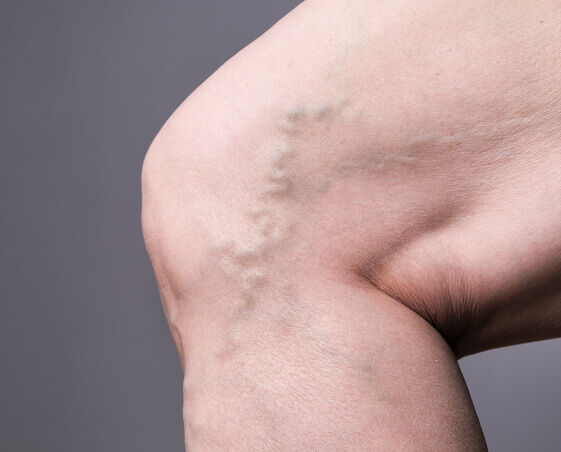Varicose Veins: Causes, Symptoms, and Treatment
Are you living with vein disease?
If you have venous insufficiency (vein disease), you understand the leg pain, swelling, aching, cramping, feelings of heaviness, and telltale twisted or bulging purple or blue leg veins. If you’ve been living with untreated vein disease long enough, you may have developed complications such as skin discoloration, leg ulcers, or a blood clot in the leg.
Click below to learn what varicose veins are, what causes varicose veins, the risk factors, the symptoms to look out for, and the treatment options for varicose veins.

Varicose Vein Treatment
Treatment options for varicose veins range from self-care measures and wearing compression stockings to office-based surgical procedures. These minimally invasive procedures are performed as an outpatient and take an hour or less to complete. Patients go home on the same day with few restrictions. While medical treatment may not be necessary if no symptoms are present, it's important to note that varicose veins are a progressive condition and can worsen over time without intervention.
Your board-certified Center for Vein Restoration specialist customizes a treatment plan that is right for you. All procedures are performed as an outpatient in the vein clinic. Local anesthetic is used to numb the leg. Patients are awake but will not feel pain.
Vein treatment options include:
Varithena
This minimally invasive, non-surgical treatment is used for various varicose vein conditions. A small injection of microfoam causes the affected veins to collapse, and blood flow redirects to healthy vessels. This catheter-based technique is highly effective due to the foam's advanced and absorbable nature.
Ultrasound-Guided Foam Sclerotherapy
A safe and effective treatment for complex varicose veins, this minimally invasive procedure uses ultrasound guidance to inject a foam medicine called a sclerosant into the problem vein, where it initiates a reaction and closes the vein. The body absorbs the collapsed vein, rerouting blood flow to healthy veins.
See Ultrasound-Guided Foam Sclerotherapy >
VenaSeal
This fast, gentle FDA-approved microfoam treatment improves the appearance of varicose veins and their related physical symptoms with little to no downtime. VenaSeal uses a proprietary medical adhesive to close varicose veins.
ClariVein
ClariVein is a minimally invasive treatment option that combines two approaches to treat problem veins: mechanical (a special catheter with a rotating tip) and chemical (medicine seals off the problem vein, preventing new blood vessels from forming).
Laser Ablation
A thin fiber is gently inserted through the skin and into the affected vein. This laser fiber heats the vein and closes it shut. The body reabsorbs the closed vein, and the blood supply is rerouted through healthier veins.
Radiofrequency Ablation
During this minimally invasive procedure, radiofrequency energy is used to heat, damage, and close the walls of the affected vein. The vein will be absorbed in the tissue, and the blood will reroute to nearby healthy veins.
Ambulatory Phlebectomy
During this outpatient procedure, problem varicose veins near the skin’s surface are easily removed through tiny puncture incisions—no stitches required. Local anesthetic keeps patients comfortable. Patients are encouraged to walk immediately and resume normal activity with few restrictions.
Lifestyle Changes
Regular exercise, maintaining a healthy weight, avoiding prolonged sitting or standing, elevating the legs, wearing compression stockings, and a balanced diet rich in fiber can help reduce pain and decrease risk; however, varicose vein disease is progressive and does not go away on its own.